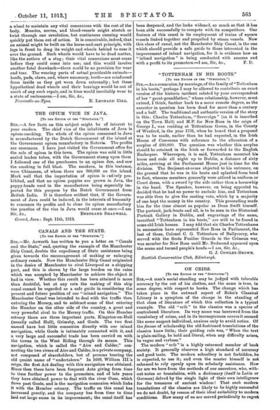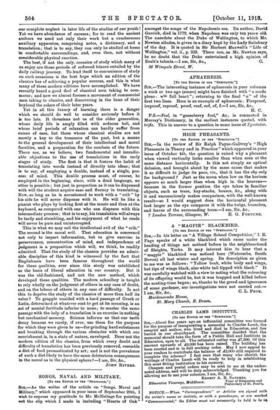ON CRIBS.
[To THE EDITOR OF TEE "SPECTATOR."] SI11,—A man's social standing may be judged with tolerable accuracy by the cut of his clothes, and the same is true, in some degree, with respect to books. The change which has taken place in the outward aspect of Bohn's Classical Library is a symptom of the change in the standing of that class of literature of which this collection is a typical example. The old " crib " to the classics was a species of contraband literature. Its very name was borrowed from the vocabulary of crime, and in its inconspicuous covers it seemed like some suspect individual, anxious only to avoid notice. Of the finesse of scholarship the old-fashioned translations of the classics knew little; their guiding rule was, " When the text is plain-sailing, be bold and literal, when any difficulty arises, be vague and verbose."
The modern "crib" is a highly esteemed member of book society. It generally observes a high standard of accuracy and good taste. The modern schoolboy is not forbidden, he is expected, to use it; and even the master himself is not ashamed to rely openly upon its scholarly assistance. How far are we here from the methods of our ancestors, who, with- out notes or translation, with a dictionary (itself in Latin or German) delved by the single light of their own intelligence for the treasures of ancient wisdom ! That such modern translations of the classics are likely to be highly successful we do not doubt, by reason of their ideal suitability to modern conditions. How many of us are moved periodically to regret our complete neglect in later life of the studies of our youth! Yet we have abundance of excuses; for to read the ancient authors we need not only their work but a cumbersome auxiliary apparatus, comprising notes, a dictionary, and a translation ; that is to say, they can only be studied at home in comfortable surroundings, and, even then, not without considerable physical exertion.
The best, if not the only, occasion of study which many of us enjoy are those periods of enforced leisure entailed by the daily railway journey. To lend itself to convenience of study on such occasions is the best hope which an edition of the classics has of achieving a popular success, and this is what many of these modern editions have accomplished. We have recently beard a good deal of classical men taking to com- merce; and now we almost foresee a movement of commercial men taking to classics, and discovering in the bane of their boyhood the solace of their later years.
Yet in all this luxury of learning there is a danger which we should do well to consider seriously before it is too late. It threatens not us of the older generation, whose daily life is amply filled with arduous toil, and whose brief periods of relaxation can hardly suffer from excess of ease, but those whose classical studies are not merely a key to the treasures of the past, but a means to the general development of their intellectual and moral faculties, and a preparation for the combats of the future. There are, as we believe, two fundamental and ineradic- able objections to the use of translations in the early stages of study. The first is that it fosters the habit of translating into words instead of directly into ideas; that is to say, of employing a double, instead of a single, pro- cess of mind. This double process must, of course, be employed in the beginning, since, with a dead language, no other is possible ; but just in proportion as it can be dispensed with will the student acquire ease and fluency in translating. Now, so long as he is accustomed to work with a " crib " by his side he will never dispense with it. He will be like a pianist who plays by looking first at the music and then at the keyboard, as compared with one who can dispense with this intermediate process ; that is to say, his translation will always be tardy and stumbling, and his enjoyment of what he reads will never be pure and uninterrupted.
This is what we may call the intellectual evil of the crib." The second is the moral evil. That education is concerned not only to impart information, but to give exercise in perseverance, concentration of mind, and independence of judgment is a proposition which will, we think, be readily admitted. That the study of the classics provides an admir- able discipline of this kind is witnessed by the fact that Englishmen have been famous throughout the world for these qualities, ever since this study was established as the basis of liberal education in our country. But it was the old-fashioned, and not the new method, which developed these qualities. The modern schoolboy is taught to rely wholly on the judgment of others in any case of doubt, and on the labour of others in any case of difficulty. Is not this to deprive the study of the classics of more than ball its -value P To grapple unaided with a bard passage of Greek or Latin, determined at whatever cost to get at its meaning, is an act of mental fortitude inferior to none; to master the same passage with the help of a translation is an exercise in nothing but mechanical memory. Science informs us that our teeth decay because we rarely, if ever, use them for the purpose for which they were given to us—for grinding hard substances and breaking through the various obstacles with which our nourishment is, in a state of nature, enveloped. Does not the modern edition of the classics, from which every doubt and difficulty of translation has been previously removed, resemble a diet of food premasticated by art; and is not the prevalence of such a diet likely to have the same deleterious consequences in the moral as in the physical sphere P —I am, Sir, &c.,
JOHN RIVERS.















































 Previous page
Previous page